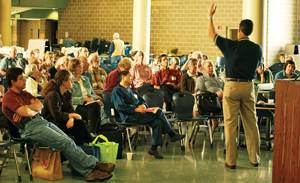Community members learn how to ‘Be Cool’

Steve WIlson talks at the Ames “Be Cool” meeting held at the Ames Middle School, Sat., Sept. 27, 2008 from 9am to 3pm. He talked with groups and discussed ways to reduce their carbon footprint. Photo: Molly McKernan/Iowa State Daily
September 28, 2008
On a September day that broke 80 degrees, Ames community members gathered and were encouraged to “Be Cool” when it comes to the environment.
Erv Klaas, professor emeritus of animal ecology and commissioner for the Story County Soil and Water Conservation District, spoke about changing attitudes and lifestyles to make Ames a greener place to live. Klaas also was the 2008 winner of the Lawrence and Eula Hagie Heritage Award, which recognizes individuals’ dedication, service and education for Iowa’s environment.
“We should be partnering with the business community and Iowa State University to make Ames the greenest city in Iowa. Doing this will save us money, create new green jobs and bring our community together,” he said. “Of course, we must take responsibility as individuals, too. We are beginning that process today by sharing that information and coming together in sprit to begin a change.”
He talked about what Iowa State is doing to promote a more sustainable and green campus, including the council on sustainability and the new sustainability director.
“They’ve been taking it seriously, I think, and that group could partner very well with the city,” he said.
Klaas said action needed to be taken locally, without waiting for the federal government to take charge.
“We need to start at the local level with city and state governments. I’ve been trying for several years to convince our city policy-makers to develop a comprehensive plan of sustainability,” he said. “The Cool Cities Initiative … is a great step forward … but I think we can do much more. “
Klaas suggested establishing a department of environment in the city of Ames. This department would coordinate sustainability programs, connect with and inform the public, be an entity for innovation and creativity, facilitate local food distribution and even look to other cities for ideas.
He responded to a question about how such a department could be established in the city of Ames by citing two groups who have already evolved their efforts: Smart Growth Alliance and A Mid-Iowa Organizing Strategy.
Klaas said the city could use both incentives and mandatory regulations to bring out a change in people’s behavior.
“If a huge city such as Chicago can make the environment a top priority, surely Ames could. I believe Ames could use everything that is available,” he said.
A question was raised from a community member about how to reach out to people who deny the fact that there are environmental problems not only throughout the nation, but in Ames as well.
“I agree that there are people who say that, but at the same time there are a lot of people, including most of the people here, who don’t say that,” he said. “And that’s what my hope is that we can work together and break out of that kind of thinking.” Klaas also went on to say denial was very unproductive.
Community members who attended the forum were able to hear lectures on the global climate change and what it means to the Midwest. They also heard about sustainability and enhancing the capacity for self-renewal. In addition, participants attended two breakout sessions from a choice of four: energy, green building, water and local food systems.
Penny Brown Huber, founder and executive director of Grow Your Own Small Market Farm, spoke about the organization of local food systems and the importance of implementing local food distribution. She said Iowa brings in about 180,000 food trucks per day, which raises the cost of our food as well as contributes to greenhouse gas emissions. She said these extra costs could be avoided if we implemented a local food system.
Linda Barnes, associate professor of biology at Iowa Valley Community College, also presented on the importance of local food systems.
“Food choice and energy use are tightly related to one another. In industrial nations, 30 percent of our carbon footprint and 30 percent of our energy use have to do with getting food to your table,” Barnes said.
“Ames, Be Cool — Why and How to Conserve Resources” was presented by the City of Ames, Ames Community School District and A Mid-Iowa Organizing Strategy.
















